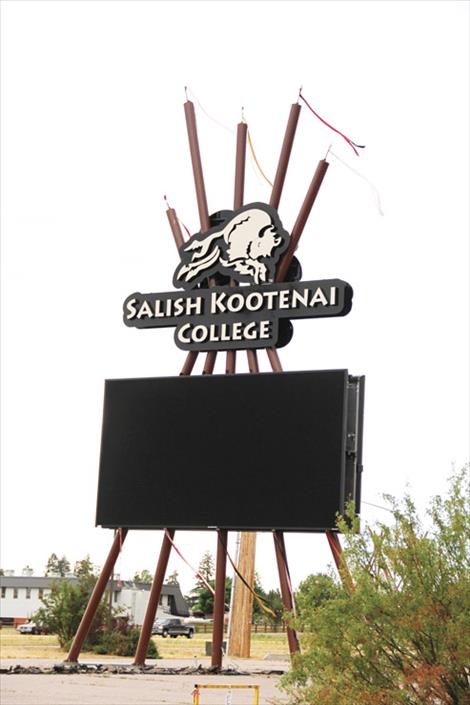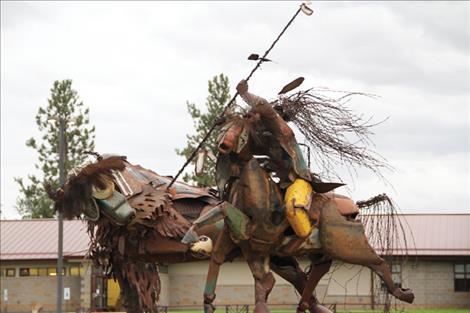SKC offers 50% reduced tuition, installs new ‘health’ message board
Hey savvy news reader! Thanks for choosing local.
You are now reading
1 of 3 free articles.
PABLO — As the Salish Kootenai College (SKC) opens its doors for another school year, a number of developments have been put in place to enhance student education.
This year will see the continuance of the 50% tuition reduction for all students, tribal and non-tribal alike, across all levels from certificate to graduate programs. Begun in 2020, the measure was brought about thanks to Covid relief funding supplied to the college.
“Students were at home, trying to go to school, many times as single parents and it really put a stretch on their family budgets. People were having to decide between going to school and providing for their families and we decided ‘this is something we can do,’” SKC President Sandra Boham explained. “Everybody knows the price of gas, the price of food has gone up, (along with) housing issues and so we have put a lot of effort into that as well to help students be able to afford college as best they can.”
Despite lower tuition costs, the college has been able to put new programs in place for students. This year sees the start of their one-year certificate in computer science and computer programming, allowing students to learn skills and go straight into the workforce without years in the classroom. Over the summer, they saw their first cohort of graduate students in their education program fill to capacity. This will be the second year of their natural resource management graduate program. A ten-week automotive program has started to teach basic car maintenance and their construction program will be building a tiny house.
Additionally, a new Health Sciences building will be opened upon completion to house their nursing program. “It’s a really nice building and I think students will really enjoy the learning environment that we’re building there,” Boham said. Its first phase includes their certified medical assisting program, a dental clinic and dental assisting program, along with their EMT and phlebotomy programs.
“One of the things people might not know about SKC is the way that we grow and design the programs that we offer is in response to tribal and business needs in our community,” Boham commented. “So, while it may benefit other communities as well, the priority is really what does business need here, what does the tribe need here?”
During the initial onset of Covid, the community mindset of the college became obvious to those involved. Boham explained that the pandemic hit locally just as the college was going into spring break. “We had two weeks before the beginning of our spring quarter to get everything shifted online and get all of our protocols in place to keep people safe,” she said. “We didn’t really have the capacity to do online education. We had the resources minimally to do some, but not on that scale. (But) the thing about SKC that makes SKC the way that it is, is that there is an incredible team of people there,” Boham went on. “They were willing to look at options, figure out what we could do, and we went completely online within those two weeks.”
With many students also being parents, they juggled teaching their kids at home, sometimes sharing a single computer. So, SKC started a laptop checkout system and this boosted the internet capacity on campus. With the increased cost of food because families were eating every meal at home some households ended up in a budgetary pinch. To offset costs, the college began offering “Food Box Fridays,” that included fresh fruits, vegetables, meat, and milk. This program now even has a pantry attached to it. Money was poured into health and mental health services for students and employees alike and efforts were made to normalize the message “It’s okay to ask for help.”
When vaccines became available the school began to hear about people having a hard time getting to them due to the cost of gas and babysitting. The college then provided Visa cards to when people got their vaccinations, offsetting those costs as well. The campus now has a high vaccination rate for all three available vaccinations.
Even as the pandemic has come to a more manageable level, SKC has taken what it learned during Covid and continued to grow and provide for the needs of its attendees. They will continue to offer in-person classes but now offer distance classes too. Boham said people are responding positively to the distance classes, particularly those in the workforce.
SKC’s language and culture program, built around the concept of apprentices, has helped to perpetuate the cultures of the Salish, Kootenai and Pend d’Oreilles people. “It took us awhile to get it up and running,” Boham commented. “We were having a lot of conversations with culture committees and other folks about what it should look like and who should be involved. But it’s been really received well and has been successful. We have quite a few students who have been choosing to take that path, so that’s exciting.”
A large sign has been installed on the side of the road that will provide campus information along with important safety news for the traveling public, such as road closures due to fires.
The college also began partnering with the seven other tribal colleges in Montana to create systems that allow students to accomplish part of their education where they are and part of it with the SKC. This should help mitigate some of the housing issues that became exacerbated by Covid.
“We’ve seen a lot of people move into the area, a lot of the inventory for rentals is gone,” Boham said. “It’s not just a student issue … there’s a coalition of people working together to figure out how we’re going to solve some of those problems going forward. We’re going to have to think about it the way we always do: what are the needs now and what are the needs going to be in the future and how do we protect this place that we love and not make it into something else?”
To learn more about Salish Kootenai College and its programs, including free classes for those earning their HISET (similar to a GED), as well as their early childhood education initiative, visit: skc.edu.

















